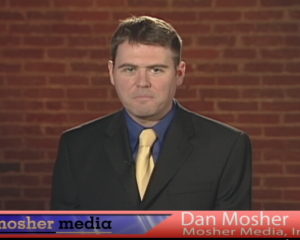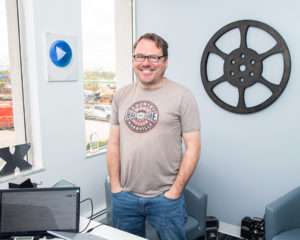Somehow I have made it to age 44 without ever going bankrupt, but that’s not to say I haven’t come close on one or two occasions. Imagine being 24-years-old with $35,000 in debt, unpaid payroll taxes, and dozens of unedited wedding and graduation ceremonies that were due months ago. That story was told through a presentation I gave to the entire company which I called “Celebrating Failure”. That’s right. I held a company party to celebrate the 20 year anniversary of the moment I realized I had run the video production operation in to the ground. I brought out the pictures of the operation and told the whole drawn out war story as part of my “state of the company” address. The point I wanted to make is that if we move forward without the fear of risk and celebrate failure as the incredible life lesson it can be than there will be nothing to stop us. The real point is that I know failure. I have lived it, and I am not embarrassed to admit my mistakes.
“I was fortunate to have made big mistakes at age 24.”
In 1998, between fielding calls from angry clients and dodging the office landlord, I soon realized the daunting challenge of running a business in your early 20’s. Today I joke about only having 48 credit hours from The University of Akron. The reality is that running the business poorly was my education. The truth is, 24 is an age where you can make some pretty big mistakes… and I did.
I started the video production business in during my senior year of high school in March of 1992. By 1996 or so it was a growing operation. My good friend Dan Caton and I ran the company together, at that time it was known as Mosher Video Services. Together we shot and edited wedding ceremonies, high school graduations, and prom gigs. During the week Dan Caton went to Kent State University and worked on his degree in Media and I would take on the corporate video jobs at Goodyear. In the wedding and event business we booked clients months in advance, which supported our lofty goal:
“Book 100 weddings in 1998.”
This is when things fell apart. The problem wasn’t that we couldn’t shoot all the events, in fact Dan and I often hired a team of freelancers to work Saturdays and cover everything we needed. Then it was up to us to to edit and ship each video off “in time.” However by October of 1998 we ended up with an overload of graduation and wedding video projects that were supposed to be edited, duplicated and delivered earlier that summer.
In the midst of our own growing pains we had not put the pencil to the paper to realize that we had not been charging enough to cover all the shooting, editing and operating costs. We did not have the resources to edit all the videos in a timely and efficient manner. As a result, we regularly received angry phone calls from parents and brides expecting to have their videos by now. They had every right to be upset, after all, they paid for them… 3 months ago! Where were they? Well, they were on a stack with 40-something other videos that also needed edited. It took a few days to edit a wedding on our S-VHS tape edit system and we were overwhelmed.
“We were completely out of cash. We had absolutely nothing.”
At the same time, we were about to get evicted. I laugh about it today, but I learned real fast that we weren’t going to be able to stay in business if we didn’t pay rent and taxes. From 1996 to 1998, I learned through IRS notices the concept of withholding taxes and trust taxes. From FICA to Sales Tax I was like a fifth-grader trying to learn algebra. If you’re taking money out of someone’s paycheck and holding it in your account you better make sure it goes to the appropriate government agency. You’re essentially holding the government’s money in the event something happens to an employee. The money belongs to the government, and failing to pay it could actually lead to a prison sentence. I learned that lesson quickly after understanding that FICA payroll matching funds were about 11% covering Social Security, Medicare, and Medicaid. These people should have been contractors, not employees. What a mistake! This was my college.
Another huge mistake was charging tens of thousands of dollars in cameras, computers, video recorders and even cars on a company credit card. Quite honestly, the credit card company may share some of the blame. What bank should give a 22 year-old a credit card with a $30,000 limit? That’s just was how it was in the nineties.
I’ve always said how thankful I am for the support of my parents; they’ve always been there to give me advice. At times we even operated our video business from office space that belonged to their business, Mosher Medical. They were close to all the chaos as it occurred, allowing everyone at Mosher Medical to get to know the crew at Mosher Video Services. Dan Caton even ended up accepting a position there after developing such a strong bond and after the video operation collapsed.
My mom and dad are a great team and together they built a great business. They were and are the example I live by. I knew that they weren’t going to bail me out financially at age 24, so I was determined to return to the business no matter what challenge came my way. By October of 1998 things were so bad I had considered bankruptcy. I was in so deep in debt it seemed like the only way out. The credit card balances were so high I decided to literally go for broke and charge a vacation. After a soul-searching trip to Florida I came back refreshed, reset and ready to start over. I decided to just work through the problem, pay off the debt and keep it going.
“So, I started from scratch.”
In October of 1998 it all collapsed. I gathered my equipment, tapes, and coffee pot, and set up shop in my parents basement. Back in the day videos we did were shot on S-VHS. I had this “video toaster” editing system on a Commodore Amiga and playback decks and a record deck connected to this computer. Each tape playback deck would correspond to “Camera A” and “Camera B” and then the computer would mix this source video footage to the record tape. I stayed up all night editing. For duplication I had 10 VHS decks so we could make 10 copies at a time. For instance, if Stow High-School had 400 kids in the senior class we would probably get an order for 200 tapes. I had to do this 20 times, as I was literally going back and forth between editing and the duplicator. After the tapes were finished, I packed them in my 1998 Honda Civic and hand-delivered each video. I typically left them on people’s doors and sprinted away for the risk of running into upset parents. Every now and then I was held up and yelled at, but I knew I deserved it.
From then on, I wanted to make sure we fulfilled our obligation to deliver every video that had been ordered and paid for. We drove from high school to high school dropping off senior videos. In most cases we just did deliveries directly to people’s homes. Some areas were more difficult than others, especially the rural areas where the homes were far apart. I spent three years, from 1999 to 2001 working to pay off the $35,000 credit card and business loan debt. At 28% interest the credit card debt wasn’t easy, but by doing corporate video work for a major company and producing local TV spots for the cable company I made it work. The TV spot and corporate video work became the foundation for what the business is today. The producers in the major corporate video department that regularly hired me also played a major role in helping me get it all back together. They not only sent me work but taught me so much about corporate culture and video for business. If running a business in to the ground was my undergraduate, working with these producers was grad school. It’s now October 2018, nearly 28 years since I started the video business and 20 years to the day of it’s near bankruptcy and subsequent transformation to the Mosher Media name. As I reflect on that era I realize how thankful I am for my family, friends and co-workers that helped us get through it all. I thank Dan Caton for being the “Good Dan” to my “Bad Dan” and smoothing things out when it all went wrong. Without these experiences I could not be as dedicated to the success of the video business as I am today. I am proud of the mistakes and the failures. I own them and I celebrate them. My goal now is to continue the build a company that never fails customers, crew and stakeholders.


